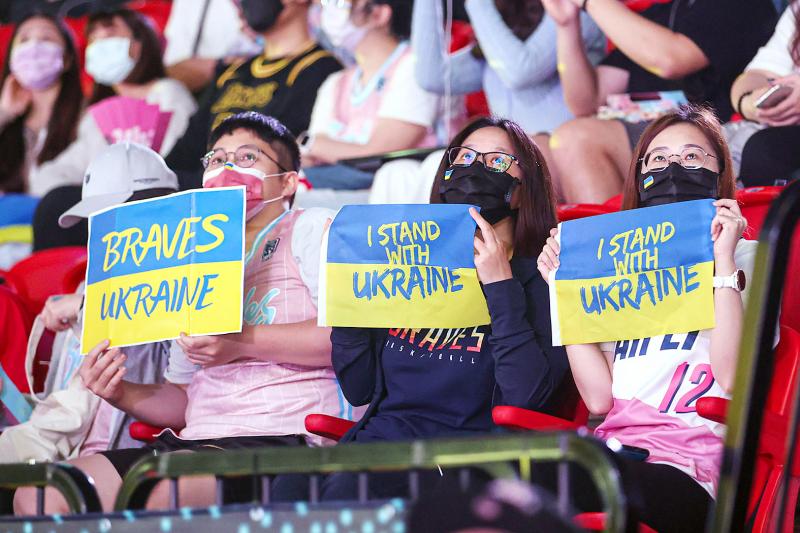The EU on Friday eyed an extra 500 million euros (US$546 million) in military support for Ukraine and fresh sanctions on Russia as Moscow’s war spurred vows to bolster the bloc’s defenses.
EU leaders meeting for a summit in France’s Palace of Versailles described Moscow’s attack on Ukraine as a wake-up call for the 27-nation bloc to take a tougher approach to ensuring its security.
“There’s no denying the fact that two weeks ago we woke up in a different Europe, in a different world,” European Council President Charles Michel said.

Photo: CNA
The EU’s executive put forward a proposal to double its financing for sending weapons to Ukraine to 1 billion euros as the West scrambles to back Kyiv’s forces in the face of the Kremlin’s onslaught.
The bloc last month broke a long-standing taboo by agreeing to pay for arms deliveries to Ukraine after Russian President Vladimir Putin launched the invasion of his pro-Western neighbor.
The move was part of a broad push by Ukraine’s allies to send weapons amid desperate pleas from Kyiv for air-defense systems after calls to impose a no-fly zone were rebuffed.

Photo: AP
Alongside further arms supplies, EU leaders also said they were readying a fresh round of economic punishments as they look to keep up pressure on Putin over the bloodshed.
The West has already hit Moscow with a barrage of unprecedented sanctions, but the EU has so far failed to agree to follow the US’ lead in hitting Russia’s key oil and gas exports.
French President Emmanuel Macron warned Putin of further “massive sanctions” if he steps up the bombing or seeks to besiege Ukraine’s capital, Kyiv.
“In that case, nothing is off the table, nothing is taboo,” Macron said.
“We will do whatever we deem to be effective and useful to halt Russia in its aggression,” he said.
European Commission President Ursula von der Leyen said the bloc would ban the export of luxury goods to Russia, striking a “direct blow to the Russian elite.”
As the EU has broken new ground in sending arms abroad, it has also been shocked into reconsidering its approach to security after decades relying on US-led NATO to ensure Europe’s defenses.
Leaders agreed in a declaration “to increase substantially defense expenditures” and bolster cooperation on military projects between member states.
“We must resolutely invest more and better in defense capabilities and innovative technologies,” the declaration said.
Estonian Prime Minister Kaja Kallas said the bloc was looking at issues such as whether to “procure common capabilities, for example, that are too expensive for any individual state to buy on their own.”
She also called for all EU members states — six of which are not in NATO — to mirror the military alliance’s commitment to spend at least 2 percent of GDP on defense.

SECURITY: As China is ‘reshaping’ Hong Kong’s population, Taiwan must raise the eligibility threshold for applications from Hong Kongers, Chiu Chui-cheng said When Hong Kong and Macau citizens apply for residency in Taiwan, it would be under a new category that includes a “national security observation period,” Mainland Affairs Council (MAC) Minister Chiu Chui-cheng (邱垂正) said yesterday. President William Lai (賴清德) on March 13 announced 17 strategies to counter China’s aggression toward Taiwan, including incorporating national security considerations into the review process for residency applications from Hong Kong and Macau citizens. The situation in Hong Kong is constantly changing, Chiu said to media yesterday on the sidelines of the Taipei Technology Run hosted by the Taipei Neihu Technology Park Development Association. With

CARROT AND STICK: While unrelenting in its military threats, China attracted nearly 40,000 Taiwanese to over 400 business events last year Nearly 40,000 Taiwanese last year joined industry events in China, such as conferences and trade fairs, supported by the Chinese government, a study showed yesterday, as Beijing ramps up a charm offensive toward Taipei alongside military pressure. China has long taken a carrot-and-stick approach to Taiwan, threatening it with the prospect of military action while reaching out to those it believes are amenable to Beijing’s point of view. Taiwanese security officials are wary of what they see as Beijing’s influence campaigns to sway public opinion after Taipei and Beijing gradually resumed travel links halted by the COVID-19 pandemic, but the scale of

A US Marine Corps regiment equipped with Naval Strike Missiles (NSM) is set to participate in the upcoming Balikatan 25 exercise in the Luzon Strait, marking the system’s first-ever deployment in the Philippines. US and Philippine officials have separately confirmed that the Navy Marine Expeditionary Ship Interdiction System (NMESIS) — the mobile launch platform for the Naval Strike Missile — would take part in the joint exercise. The missiles are being deployed to “a strategic first island chain chokepoint” in the waters between Taiwan proper and the Philippines, US-based Naval News reported. “The Luzon Strait and Bashi Channel represent a critical access

Pope Francis is be laid to rest on Saturday after lying in state for three days in St Peter’s Basilica, where the faithful are expected to flock to pay their respects to history’s first Latin American pontiff. The cardinals met yesterday in the Vatican’s synod hall to chart the next steps before a conclave begins to choose Francis’ successor, as condolences poured in from around the world. According to current norms, the conclave must begin between May 5 and 10. The cardinals set the funeral for Saturday at 10am in St Peter’s Square, to be celebrated by the dean of the College